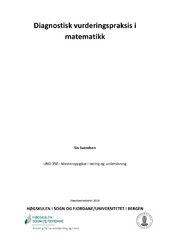Diagnostisk vurderingspraksis i matematikk
Master thesis
Permanent lenke
https://hdl.handle.net/1956/8959Utgivelsesdato
2014-11-11Metadata
Vis full innførselSamlinger
- Department of Education [300]
Sammendrag
In 2004, a report from OECD concluded that Norwegian schools lacked information about the progress of the students, and furthermore did not have sufficient tools for identifying students who needed extra support. After this report, assess meant for learning became a priority in Norwegian schools, and there has been spent much time and resources on developing tools that can be used by teachers during the assessment. In addition, there has been directed a greater focus on how to monitor students in their learning process so that they can further develop their skills throughout primary school. Diagnostic assessment is the topic of this thesis. The purpose is to gain an understanding on how teachers understand diagnostic assessment and the experiences they have linked to this concept. This has led me to the following research question: What kind of experiences do primary teachers have with diagnostic assessment in mathematics? My secondary problem is: How is the work of diagnostic assessment in mathematics conducted at two different schools? The thesis is based on the accounts of teachers' experiences with diagnostic assessment in mathematics. Other key sources are previous research and national policy documents.The thesis is conducted as a social science survey. Qualitative interviews and studies of the theory have been the basis for my information retrieval. The selection consists of two focus groups with a total of nine participants who teach mathematics in primary or lower secondary stages. The survey takes a look at the experiences they have with diagnostic assessment in mathematics and how they use diagnostic assessment tools in their teaching. The thesis explains the term diagnostic assessment within the formative assessment perspective and why diagnostic assessment plays a key role in the school. The thesis will also address the mapping tool Alle Teller. Findings of the study show that teachers have fragmented knowledge of diagnostic assessment in mathematics and how they can use this as a means of formative assessment. The full potential of diagnostic assessment tools i s in this way not used. OECD sine rapporter fra 2004 konkluderte med at norsk skole hadde en utbredt mangel på informasjon om elevers progresjon, og lite utviklede kartleggingsverktøy for å identifisere elever som hadde behov for ekstra oppfølging. Etter dette ble vurdering for læring et satsingsområde i norsk skole, og fra nasjonalt hold er det brukt mye tid og ressurser på å utvikle verktøy som kan brukes av lærere i underveisvurderingen. I tillegg er det rettet et større fokus på hvordan man kan følge opp elever i læringsprosessen slik at de kan videreutvikle sin kompetanse gjennom hele grunnskolen. Diagnostisk vurdering er tema i denne oppgaven. Formålet er å få en forståelse for hvordan lærere ser på diagnostisk vurdering og de erfaringer de har knyttet opp mot begrepet. Dette har ledet fram til problemstillingen: Hvilke erfaringer har lærere i grunnskolen med diagnostisk vurdering i matematikk? Med underproblemstillingen: Hvordan blir arbeidet med diagnostisk vurdering i matematikk gjennomført på to ulike skoler? Oppgaven baserer seg på skildringer om læreres erfaringer med diagnostisk vurdering i matematikk. Andre sentrale kilder i forskningen er tidligere forskning og nasjonale styringsdokumenter. Oppgaven er gjennomført som en samfunnsvitenskapelig undersøkelse. Kvalitative intervjuer og studier av teori har vært utgangspunkt for innhenting av informasjon. Utvalget består av to fokusgrupper med til sammen ni deltakere som underviser i matematikk på barnetrinn eller ungdomstrinn. Undersøkelsen tar for seg hvilke erfaringer de har med diagnostisk vurdering i faget matematikk og hvordan de bruker diagnostiske vurderingsverktøy i faget. Oppgaven gjør rede for begrepet diagnostisk vurdering innenfor det formative vurderingsperspektivet og hvorfor diagnostisk vurdering bør ha en sentral rolle i skolen. Oppgaven vil også ta for seg kartleggingsverktøyet Alle Teller. Funn i oppgaven kan tyde på at lærere har fragmentert kunnskap om diagnostisk vurdering i matematikk og hvordan de kan bruke denne som underveisvurdering. På den måten blir ikke det fulle potensialet til diagnostiske vurderingsverktøy brukt.
